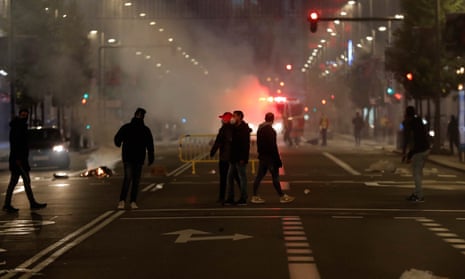Spain’s prime minister, Pedro Sánchez, has called for an end to “the violent and irrational behaviour” of a minority of people after a weekend of angry demonstrations in cities around the country against the government’s decision to declare a six-month state of emergency in response to the coronavirus pandemic.
Thirty-two people were arrested and 12 injured in Madrid on Saturday night after a protest over the region’s midnight to 6am curfew turned violent, with rubbish bins set alight on the city’s Gran Vía and skirmishes with police.
There were also protests over the weekend in Barcelona, Málaga, Vitoria, Valencia, Santander and Burgos.
Police in Logroño, the capital of the La Rioja region, arrested six people on Saturday night after bins were torched and some shops smashed and looted. Videos showed shop windows being broken and large crowds of people running from riot police.
One shop owner in the city said she had lost stock and money to the looters. “They broke three display windows, ransacked them and half the shop, broke mannequins, helped themselves to the clothes racks, ripped off the computer and took money from the cash till,” Cristina Pérez told local TV.
However, on Sunday morning groups of young people from the city took to the streets to begin clearing up the previous night’s mess and debris.
Sánchez, who secured parliamentary support earlier this week for the six-month state of emergency, appealed for calm and solidarity. “Only through responsibility, unity and sacrifice will we be able to beat this pandemic that is ravaging every country,” he tweeted on Saturday night. “The violent and irrational behaviour of minority groups is intolerable. This isn’t the way.”
The president of the Madrid region, who has clashed with Sánchez and accused the central government of overstepping its powers, also called for responsibility. “The people sowing chaos on the streets are not those most vulnerable to the virus, nor are they the ones fighting for their lives,” said Isabel Díaz Ayuso. “They are organised groups looking to take advantage of the situation and people’s fears.”
Although some of the protests have been led by far-left groups, police believe some of the demonstrations have involved “far-right elements”.
The far-right Vox party, which has bitterly criticised the Socialist-led government’s handling of the pandemic, has done little to defuse tensions. Its leader, Santiago Abascal, has said “there are more reasons than ever to protest against this government which is ruining us”, and called on the police to protect the right to protest but blamed the violence on “the far left”.
The state of emergency allows Spain’s regional governments to order an overnight curfew to run from 11pm to 6am, or to begin and finish an hour earlier or later. The only area of Spain exempt from the curfew is the Canary Islands because of what Sánchez has termed “the very positive epidemiological situation there”.
The state of emergency also permits Spain’s regional governments to bring in full or partial lockdowns, and limits public and private gatherings to six people.
Spain remains one of the countries in western Europe hardest hit by the virus. By Friday evening, it had recorded 1,185,678 cases and 35,878 deaths.
